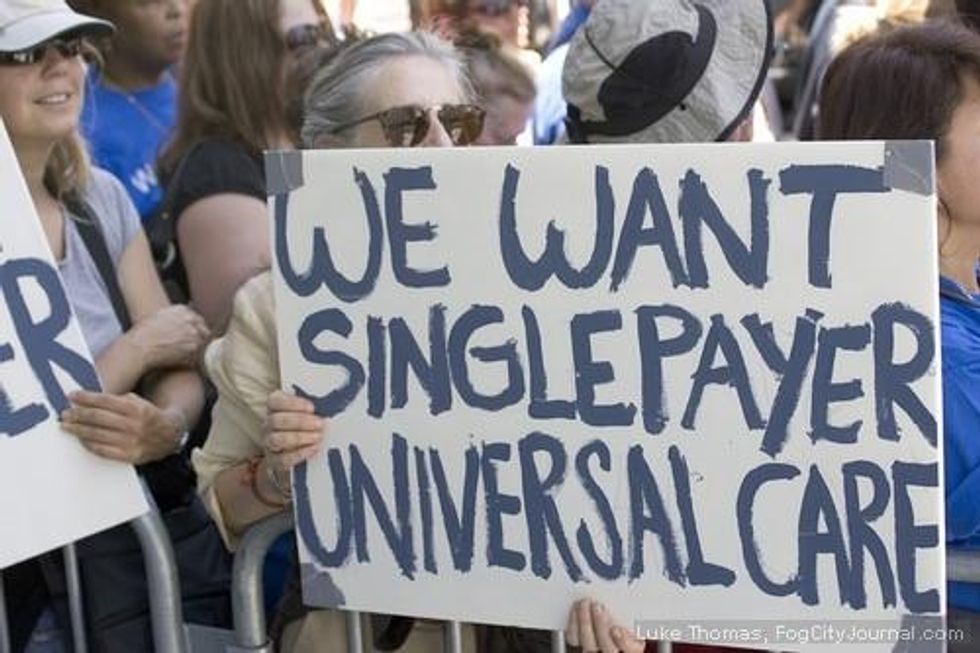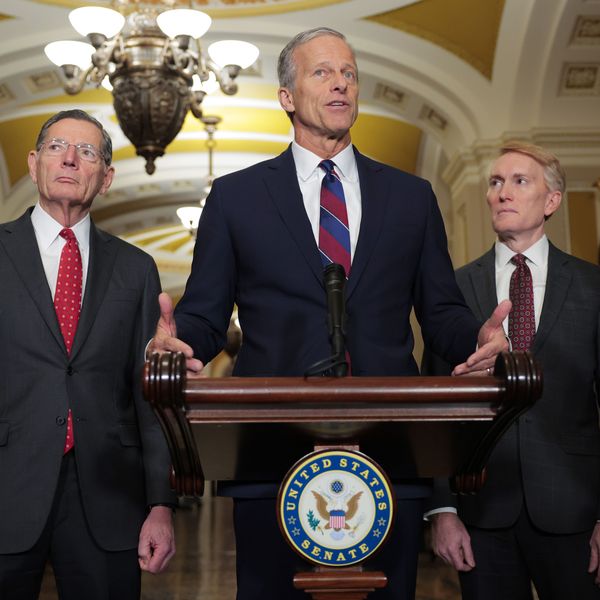'Obamacare' Bends for Big Business... Again
Critics blast Obama's decision to delay mandated employer health insurance in Affordable Care Act that was already a concession to private industry

The other provisions of the Affordable Care Act--or 'Obamacare--are slated to go through as scheduled, the Obama administration says.
The one-year delay of what Obama touted as a 'key provision' to his plan will apply to businesses that employ 50 or more full-time workers. The change was announced by the Treasury Department as a concession to big business after employer complaints over the rule's complexity, it said.
Critics charge that this latest delay exposes an underlying truth: Obamacare has been a concession to big business all along, aimed at deepening the privatization of the U.S. health care industry that is responsible for the current crisis.
"The whole bill is built around the needs of the insurance and pharmaceutical industries," Ida Hellander, director of health policy and programs for Physicians for a National Health Program, told Common Dreams. "The delay is just a symptom of this bill being too complicated and too burdensome for the many people who will be uninsured or under-insured under Obamacare."
Single-payer healthcare advocates blast the bill that will leave many without insurance, or with inadequate insurance, while fattening the coffers of the private insurance industry responsible for the current healthcare crisis that has ranked the U.S. lowest in life expectancy among the world's 'wealthiest' nations.
"This is is one more piece of evidence that we will have to replace the current healthcare system with HR 676--the improved and extended medicare for all, single payer bill that provides coverage for everyone," Don Bechler, chair of Single Payer Now, told Common Dreams.
Furthermore, critics charge that Obamacare's complex web of publicly and privately funded insurance plans are complicated, fragmented, and simply leave many people out of the equation. A recent Health Affairs study finds that approximately 30 million in the U.S. will remain uninsured under Obamacare.
"What we are seeing is a tremendous fragmentation of our health system," says Hellander. "This is the natural result of centralizing the private healthcare industry. We have already had a 50-year experiment with private healthcare. It has been a failure."
_____________________
An Urgent Message From Our Co-Founder
Dear Common Dreams reader, The U.S. is on a fast track to authoritarianism like nothing I've ever seen. Meanwhile, corporate news outlets are utterly capitulating to Trump, twisting their coverage to avoid drawing his ire while lining up to stuff cash in his pockets. That's why I believe that Common Dreams is doing the best and most consequential reporting that we've ever done. Our small but mighty team is a progressive reporting powerhouse, covering the news every day that the corporate media never will. Our mission has always been simple: To inform. To inspire. And to ignite change for the common good. Now here's the key piece that I want all our readers to understand: None of this would be possible without your financial support. That's not just some fundraising cliche. It's the absolute and literal truth. We don't accept corporate advertising and never will. We don't have a paywall because we don't think people should be blocked from critical news based on their ability to pay. Everything we do is funded by the donations of readers like you. Will you donate now to help power the nonprofit, independent reporting of Common Dreams? Thank you for being a vital member of our community. Together, we can keep independent journalism alive when it’s needed most. - Craig Brown, Co-founder |

The other provisions of the Affordable Care Act--or 'Obamacare--are slated to go through as scheduled, the Obama administration says.
The one-year delay of what Obama touted as a 'key provision' to his plan will apply to businesses that employ 50 or more full-time workers. The change was announced by the Treasury Department as a concession to big business after employer complaints over the rule's complexity, it said.
Critics charge that this latest delay exposes an underlying truth: Obamacare has been a concession to big business all along, aimed at deepening the privatization of the U.S. health care industry that is responsible for the current crisis.
"The whole bill is built around the needs of the insurance and pharmaceutical industries," Ida Hellander, director of health policy and programs for Physicians for a National Health Program, told Common Dreams. "The delay is just a symptom of this bill being too complicated and too burdensome for the many people who will be uninsured or under-insured under Obamacare."
Single-payer healthcare advocates blast the bill that will leave many without insurance, or with inadequate insurance, while fattening the coffers of the private insurance industry responsible for the current healthcare crisis that has ranked the U.S. lowest in life expectancy among the world's 'wealthiest' nations.
"This is is one more piece of evidence that we will have to replace the current healthcare system with HR 676--the improved and extended medicare for all, single payer bill that provides coverage for everyone," Don Bechler, chair of Single Payer Now, told Common Dreams.
Furthermore, critics charge that Obamacare's complex web of publicly and privately funded insurance plans are complicated, fragmented, and simply leave many people out of the equation. A recent Health Affairs study finds that approximately 30 million in the U.S. will remain uninsured under Obamacare.
"What we are seeing is a tremendous fragmentation of our health system," says Hellander. "This is the natural result of centralizing the private healthcare industry. We have already had a 50-year experiment with private healthcare. It has been a failure."
_____________________

The other provisions of the Affordable Care Act--or 'Obamacare--are slated to go through as scheduled, the Obama administration says.
The one-year delay of what Obama touted as a 'key provision' to his plan will apply to businesses that employ 50 or more full-time workers. The change was announced by the Treasury Department as a concession to big business after employer complaints over the rule's complexity, it said.
Critics charge that this latest delay exposes an underlying truth: Obamacare has been a concession to big business all along, aimed at deepening the privatization of the U.S. health care industry that is responsible for the current crisis.
"The whole bill is built around the needs of the insurance and pharmaceutical industries," Ida Hellander, director of health policy and programs for Physicians for a National Health Program, told Common Dreams. "The delay is just a symptom of this bill being too complicated and too burdensome for the many people who will be uninsured or under-insured under Obamacare."
Single-payer healthcare advocates blast the bill that will leave many without insurance, or with inadequate insurance, while fattening the coffers of the private insurance industry responsible for the current healthcare crisis that has ranked the U.S. lowest in life expectancy among the world's 'wealthiest' nations.
"This is is one more piece of evidence that we will have to replace the current healthcare system with HR 676--the improved and extended medicare for all, single payer bill that provides coverage for everyone," Don Bechler, chair of Single Payer Now, told Common Dreams.
Furthermore, critics charge that Obamacare's complex web of publicly and privately funded insurance plans are complicated, fragmented, and simply leave many people out of the equation. A recent Health Affairs study finds that approximately 30 million in the U.S. will remain uninsured under Obamacare.
"What we are seeing is a tremendous fragmentation of our health system," says Hellander. "This is the natural result of centralizing the private healthcare industry. We have already had a 50-year experiment with private healthcare. It has been a failure."
_____________________

